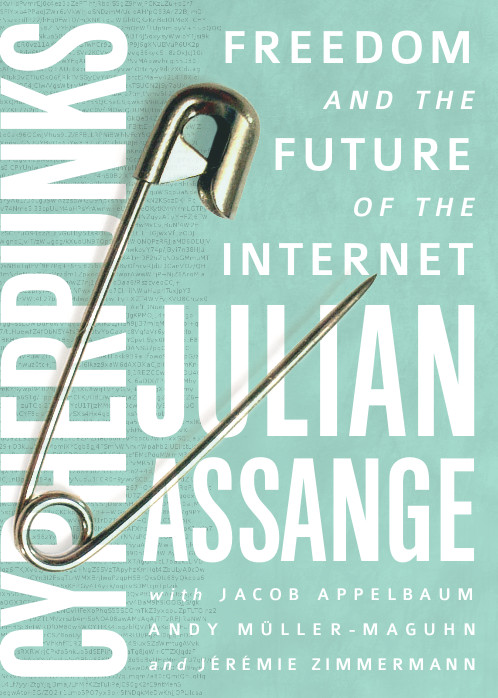Julian Assange, et al.: Cypherpunks: Freedom and the Future of the Internet (2012)
Filed under book | Tags: · activism, anonymity, censorship, code, cryptography, cypherpunk, encryption, free software, hacking, internet, internet activism, politics, privacy, software, surveillance, transparency, wikileaks

Cypherpunks are activists who advocate the widespread use of strong cryptography (writing in code) as a route to progressive change. Julian Assange, the editor-in-chief of and visionary behind WikiLeaks, has been a leading voice in the cypherpunk movement since its inception in the 1980s.
Now, in what is sure to be a wave-making new book, Assange brings together a small group of cutting-edge thinkers and activists from the front line of the battle for cyber-space to discuss whether electronic communications will emancipate or enslave us. Among the topics addressed are: Do Facebook and Google constitute “the greatest surveillance machine that ever existed,” perpetually tracking our location, our contacts and our lives? Far from being victims of that surveillance, are most of us willing collaborators? Are there legitimate forms of surveillance, for instance in relation to the “Four Horsemen of the Infopocalypse” (money laundering, drugs, terrorism and pornography)? And do we have the ability, through conscious action and technological savvy, to resist this tide and secure a world where freedom is something which the Internet helps bring about?
The harassment of WikiLeaks and other Internet activists, together with attempts to introduce anti-file sharing legislation such as SOPA and ACTA, indicate that the politics of the Internet have reached a crossroads. In one direction lies a future that guarantees, in the watchwords of the cypherpunks, “privacy for the weak and transparency for the powerful”; in the other lies an Internet that allows government and large corporations to discover ever more about internet users while hiding their own activities. Assange and his co-discussants unpick the complex issues surrounding this crucial choice with clarity and engaging enthusiasm.
With Jacob Appelbaum, Andy Müller-Maguhn, and Jérémie Zimmermann
Publisher OR Books, New York/London, November 2012
ISBN 9781939293008
192 pages
Interview with Assange where he also speaks about the book (video, DemocracyNow!, 29 November 2012)
Commentary (The Guardian)
Review (Cryptome.org)
PDF (PDF)
PDF (EPUB)
PDF (MOBI)
PDF (torrent, all 3 formats)
Video of Assange’s TV show The World Tomorrow interview the book is based on, Part 1, Part 2 (Youtube.com)
James Grimmelmann: Sealand, HavenCo, and the Rule of Law (2012)
Filed under paper | Tags: · cryptography, cypherpunk, law, micronations, sealand, wikileaks
In 2000, a group of American entrepreneurs moved to a former World War II antiaircraft platform in the North Sea, seven miles off the British coast. There, they launched HavenCo, one of the strangest start-ups in Internet history. A former pirate radio broadcaster, Roy Bates, had occupied the platform in the 1960s, moved his family aboard, and declared it to be the sovereign Principality of Sealand. HavenCo’s founders were opposed to governmental censorship and control of the Internet; by putting computer servers on Sealand, they planned to create a “data haven” for unpopular speech, safely beyond the reach of any other country. This Article tells the full story of Sealand and HavenCo—and examines what they have to tell us about the nature of the rule of law in the age of the Internet.
The story itself is fascinating enough: it includes pirate radio, shotguns, rampant copyright infringement, a Red Bull skateboarding special, perpetual motion machines, and the Montevideo Convention on the Rights and Duties of State. But its implications for the rule of law are even more remarkable. Previous scholars have seen HavenCo as a straightforward challenge to the rule of law: by threatening to undermine national authority, HavenCo was opposed to all law. As the fuller history shows, this story is too simplistic. HavenCo also depended on international law to recognize and protect Sealand, and on Sealand law to protect it from Sealand itself. Where others have seen HavenCo’s failure as the triumph of traditional regulatory authorities over HavenCo, this Article argues that in a very real sense, HavenCo failed not from too much law but from too little. The “law” that was supposed to keep HavenCo safe was law only in a thin, formalistic sense, disconnected from the human institutions that make and enforce law. But without those institutions, law does not work, as HavenCo discovered.
Published in University of Illinois Law Review, No. 2, Vol. 2012
Creative Commons Attribution 3.0 U.S. license
80 pages
via gnd
Death of a data haven: cypherpunks, WikiLeaks, and the world’s smallest nation (by the author, March 2012)
Comment (0)Cryptomorphosis (2012)
Filed under slideshow | Tags: · anonymity, cryptoanarchy, cryptography, darknet, floss, hacktivism, i2p, internet, occupy movement, security, surveillance, tor, wikileaks

This is a basic intro to hacktivism, the surveillance industry, online anonymity, encryption, filesharing, and darknets mainly intended for activists, occupiers, and all others passionate about using code and information for social change or just avoiding the seemingly all-seeing eye of the authorities.
Published in January 2012
BY-NC license
54 pages
PDF
View online (Scribd.com)

